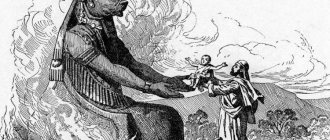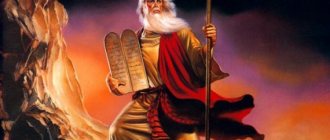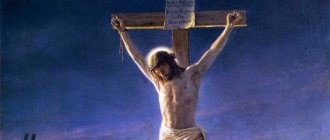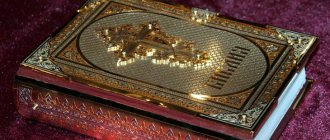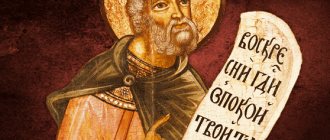Text of prayer Psalm 48
In Church Slavonic with accents
1 At the end, sons of Korah, psalm
2 Hear this in every language, inspire everyone in the world:
3 But the born of the earth and the children of mankind together are rich and wealthy.
4 Wisdom will be the voice of my mouth and the teaching of my understanding heart.
5 I will listen to the parable, I will open my ganat in the psalter.
6 I'm afraid they're fierce during the day? The iniquity of my heel will be passed on to me.
7 Those who trust in their own strength and boast about the abundance of their wealth,
8 Brother won't deliver, can a man please? He won't give God change for him,
9 is the price of the deliverance of my soul, and it will fail forever.
10 And he will live to the end, and will not see the inside.
11 When he sees that the wise die along with the foolish and foolish, they will perish and leave their riches estranged.
12 And you must destroy their habitations forever, and establish them for generations and generations, and you will call your names in the lands.
13 And man, in honor of this, has no understanding; add foolish cattle, and be like them.
14 This way tempted them, and they were pleased with it in their mouth.
15 As the sheep in hell have invested the essence, I will guard death, and they will have the laws of tomorrow, and their help promises in hell, by My glory you will be cleansed.
16 And God will deliver my soul from the hand of hell when He receives me.
17 Do not be afraid when a man becomes rich or when the glory of his house increases:
18 While he must die, not everyone will accept him, but his glory will go away with him.
19 For blessed is his soul in his belly; he will confess to you when you do him good.
20 Until his father comes, he will never see the light.
21 And man, in honor of this, has no understanding; add foolish cattle, and be like them.
In Russian
1 For performance. Psalm for Korean children
2 Hear this, all you nations; everyone living in the universe hears this,
3 simple and noble, rich and poor.
4 My mouth will speak wisdom, and the meditation of my heart is knowledge.
5 I will listen to the parable, and with the harp I will reveal my riddle:
6 “Why should I be afraid in the days of trouble, when the iniquity of my ways surrounds me?”
7 Those who trust in their own strength and boast about the abundance of their wealth!
8 A man will never ransom his brother, nor give his ransom to God:
9 the price of redemption is dear for their souls, and never will be,
10 so that someone lives forever and does not see the grave.
11 Everyone sees that the wise die, just as the ignorant and foolish die, and leave their property to others.
12 And their graves will be their dwellings forever and ever, their dwellings for generations and generations. They called their names on their lands.
13 But man will not remain in honor; it will be like the death of animals.
14 This way of theirs is their folly, although those who follow them approve of their opinion.
15 They will be shut up in the grave like sheep; death will feed them, and in the morning the righteous will rule over them; their strength will be exhausted; the tomb is their home.
16 But God will deliver my soul from the power of the grave when He receives me.
17 Do not be afraid when a man becomes rich, when the glory of his house increases:
18 For when he dies, he will take nothing; his glory will not follow him;
19 Although during his lifetime his soul makes you happy, and they glorify you because you like yourself,
20 But he will go to the family of his fathers, who will never see the light.
21 An honest and stupid person is like a dying animal.
LiveInternetLiveInternet
Quote from Papa_Loko's message
Read in full In your quotation book or community!
Peter the Grave and a Psalm from the Witch
One day a man from a neighboring town came to Master Peter Mogila and fell at his feet. He asked to be protected from the enemy who was harassing him and wanted to put him in the grave. He told the story that their family had two sons. The father was a merchant and lived quite richly. His younger brother died in adolescence, when he was not yet 20 years old, and according to his father’s will, all his merchant craft and business passed to him. He was a very kind and merciful person, he always gave alms and when anyone turned to him to borrow money or food, he never refused. Everyone who was not too lazy began to take advantage of this and began to borrow money from him and not give it back. It got to the point that they even began to threaten him and extort money in every possible way. Especially zealous was Grishka, the son of a local witch, who got away with everything, and his mother probably tried to protect him from any evil with witchcraft. So the son got loose. When Grishka once again came to Stepan, and that was the name of that man, the eldest son of the merchant, he began to mockingly demand money from Stepan. And when he refused him, he decided to get into a fight. Stepan was a healthy man and in a fit of peasant struggle he hit Grisha so that he hit his head on a stone and received a serious wound. People crowded in response to the scream and noise, and Grishka’s mother, an old witch, also came. Having found out what was the matter, she said the following words to Stepan: “I will raise my son, and I will put you in the grave.” With these words, she ordered her beaten son to be taken to her home, where in a few days she completely restored him. And from that day on Stepan became worse and worse. At night he was tormented by nightmares, his whole body began to ache, it seemed to him that someone was constantly walking in the house, and he often began to see dark shadows. Then Stepan realized that the witch’s words were beginning to come true and he was no longer a survivor in this world. He tried to turn to knowledgeable people, but everyone told him that they could not cope with such witchcraft damage, it was more expensive for themselves, and they did not want to go to bed prematurely. When Stepan turned to the next knowledgeable old woman, who was reputed to be a good healer, she also refused him. Then Stepan said to that grandmother: “Is there really no one for Christ’s sake who could help me?” Then the Medicine Woman answered him: “Only a master, a dead-man, can help you, and there are only two of them in all of Mother Rus'. I don’t know anything about one, but the second master is Peter. You need to see him if you want to live.” And she told me how to find master Peter Mogila. After everything he had experienced, Stepan, on the advice of a healer, found master Peter Mogila and, falling at his feet, asked for help.
After listening to Stepan, Master Peter commanded him: “Go to your city and keep a strict fast for a whole week. Then go to the churchyard at night and stand in the middle of it and read Psalm 48. Once you have read it three times, go to your home and on the way back don’t say a word, don’t look around and don’t look back. They will call you by name, the dead and demons will frighten you, but you walk like a deaf person until you reach your threshold. In your house, fall on your knees in front of the red corner and all night until the morning, until the first roosters, read incessantly “Alive in the Help of the Most High.” If you hold out until the morning, you will live and your deeds will grow, the Lord will help you and you will be glorious.”
With these words master Peter sent Stepan home. A few years later, Stepan told what passions happened to him when he carried out the master’s instructions. In the cemetery, when he read the psalm for the third time, the wind rose and he heard his dead brother calling him to look back, and he also heard the voice of his father and his other acquaintances who had died a long time ago. And animal barking and howling were heard right under his feet. So he almost ran home and, falling in front of the images, began to read “Alive in the Help of the Vyshnyago.” All night he read and they broke into his house, and they knocked on his windows, and he heard the witch screaming at his door and window that she would forgive him and remove the cruel mortal curse from him, if only he would open the door and let her in. words But Stepan held out, read the prayer continuously and did not open the door. In the morning, after the first rooster crowed, it became known to everyone in the city that that witch had died at night before dawn and kept lying in bed wailing: “Stepan didn’t let me in, so I’ll leave today.” After that, Stepan, although his head turned gray, began to live regularly, his affairs improved and his health became stronger.
History of writing
David had already written this psalm in his old age, when all the excitement of the family drama with the conspirators led by his son Absalom was far behind him. Absalom died, completely ignominious, although he had huge claims to power, he built a monument to himself in the hope that his descendants would worship him. But he left no offspring, and the monument did not survive its owner for long.
Psalm 81
Given the general content of the psalm, there is no obstacle to considering it to have been written during the time of David by his contemporary and singer Asaph. The psalm condemns the injustice of judges. At the beginning of David’s reign, facts of the latter kind could not have been rare, since the era of Saul’s reign, especially in his last years, when the king himself, in his relations with David, grossly violated the elementary requirements of justice, could only corrupt the judges, giving freedom to their arbitrariness, why their decisions could not stand at the level and impartiality required by law.
Similar phenomena could have occurred in the subsequent years of David’s reign, as indicated by the fact that Absalom spread among the people a complaint about the injustice of the judges. Obviously, Absalom had several similar facts at hand, which he used immoderately, generalizing random phenomena to the extent of the dominant and sanctioned by the king direction of judicial activity, i.e., created slander. It is impossible to determine exactly what time, whether the beginning of the reign of David or the time of Absalom’s uprising, should be attributed to the writing of the psalm.
God stood among the gods and menacingly denounced the latter for showing partiality to judgment, since this causes the foundations of the inner life of the people to shake. For this, the judges, despite the height of their service, will die, like any ordinary person (1-7). The writer prays to the Lord to arise for this judgment not only over the Jews, but over the whole earth (8).
Ps.81:1. God became in the host of gods; among the gods pronounced judgment:
“God became in the company of gods.” By gods, as can be seen from the context, we mean people involved in judicial matters, that is, judges: they allow partiality, like ordinary people (2–4); do not understand and do not know the responsibility assigned to them; are also subject to death, like every person (5–7). If they are called gods, then according to the purpose given to them by the Lord (6). The name of gods is attached to judges, as can be seen from (Ex. 21:6), because the will of God must be heard in their decisions, their sentences must be distinguished by impartiality, consistency with the Law of God, so that they are, as it were, God’s representatives on earth and God Himself speaks through them (Deut. 1:17). According to the psalm, God is represented as speaking among earthly judges to evaluate their activities and finding that the latter is subject to condemnation (“he pronounced judgment”).
Ps.81:3. Give justice to the poor and the orphan; Give justice to the oppressed and the poor;
Ps.81:4. deliver the poor and needy; throw him
from the hand of the wicked.
When assigning a decision, one should be guided not by the property or social status of a person, but by the essence of the case under investigation, therefore, before the judges the rich and the poor, the noble and the ignorant, must be the same.
Ps.81:5. They don’t know, they don’t understand, they walk in darkness; all the foundations of the earth are shaking.
“They don’t know, they don’t understand, they walk in darkness” - not in the sense of a lack of understanding of the law or the difficulty of the case under investigation, but in the sense of deliberate evasion of the law, conscious partiality, which leads to shaking of the earth, to shaking the foundations of inner life, to the destruction of the rule of law, and through this - to arbitrariness and violence in relations between people. If such misdeeds of the judges were unconscious and accidental, then the Lord would not have condemned them.
Ps.81:6. I said: you are gods, and you are all sons of the Most High;
“You are gods and sons of the Most High” in the sense of being representatives and closest executors on earth of the will of God in judicial decisions.
Ps.81:7. but you will die like men and fall like any prince.
The height of the position of the judge among the people and the sacred importance of his service cannot prevent heavy responsibility for the bad conduct of the case: the unjust judge will die and fall (deposed) like a simple prince or a common man. Ps.81:8
Arise, O God, judge the earth, for You will inherit all nations
Ps.81:8. Arise, O God, judge the earth, for You will inherit all nations.
The writer prays to God for the restoration of justice not only for the land of Judea, but throughout the whole world, since “all nations” are God’s heritage and are in His power.
Interpretation of Psalm 48
The psalm illuminates the essence of the Creator's providence about the future of the rich and arrogant, blessed and righteous people. The theme of Psalm 48 is relevant not only at the time of creation and today, but will continue to be until the end of the century. For there is no person who does not wonder why the rich and wicked prosper and know no sin, while the righteous live in poverty. King David proclaims the wisdom of the Lord and rewards everyone according to their deeds.
- Verses 1-5: the author calls on those living on earth to listen to the wisdom of God revealed to him, rich and poor, simple and noble. David warns that his words may seem like a riddle, but those who listen carefully will understand the meaning of the psalm.
- Verse 6: The author says that there is no need to fear death, even if enemies are surrounded on all sides. In the next story, David will explain why.
- Verses 7-10: No one escapes death. Neither rich nor powerful. There is no price to pay for death, and no one lives forever.
- Verses 11-12: No one can escape death, but the rich consider themselves wise and hope to live forever, calling cities by their proper names. There is nothing in these actions except painful self-deception.
- Verses 13-14: Those who are hungry for glory do not receive honor in life, although they have supporters who approve of their actions. But after death they will disappear into oblivion, like silent animals.
- Verses 15-16: After death, the souls of the wicked will go to hell and remain there forever. While the righteous will be in heaven in the afterlife (“the day after tomorrow”), they will be freed from eternal torment.
- Verses 17-18: We should not envy people who become rich because when they die they cannot take any of their accumulated wealth with them, neither money nor fame.
- Verse 19: While the wicked is alive, those around him flatter and praise him. Worldly glory follows earthly life. Not a single praise that he received during his life will save or lead him out of eternal darkness.
Interpretation
Psalm 35 begins with an inscription that indicates that its authorship belongs to King David, whom experts also call the servant of God, His son and youth. A deep understanding of the meaning of the work, which has survived to this day, is revealed to those who analyze in detail the meaning of individual verses of the song:
Verse 1: David speaks of meeting a man whose name he does not directly name, but even without this it is clear that he is talking about King Saul. When confronted with it, he is left with an indelible impression. The author is amazed at how much anger can hide in the human soul. She is the culprit why people become lawless. An apostate, who has suppressed the voice of conscience within, ceases to behave God-fearingly; he is not ashamed of bad deeds, words, and thoughts. Verse 2: the prophet says that his enemy repented of his sins and did not hide his hatred of him, but this is just a pretense. The king is not sincere in his words, he is trying to pass off wishful thinking. Verse 3: The author continues the theme of the enemy's lies. He promised to overcome the anger in his heart and restore justice, but he did not keep his word
Saul is blind to examples of lawlessness and does not want to learn an important life lesson. Verse 4: Continuing to talk about the king, David focuses on the fact that he entered the path of apostasy due to a lack of fear of God. Saul deceives himself, confuses those around him with slander and feigned repentance
As he prepares for bed, he is actually still a prisoner of evil thoughts. Verse 5: The focus shifts from Saul and his moral corruption to the Jewish people. Here the author mentions the mercy and goodness of the Almighty in the highest degree of their manifestation. The Lord turns a blind eye to the sins of the Jews and the disobedience of their king, and continues to sow grace on earth. Verses 6 and 7: The prophet speaks of those who sin, being confident that no one sees their sins, which means they will not face punishment. The truth is that for God there is nothing hidden or secret. The truth of man and the Lord are different, the first immediately punishes and punishes, the second tolerates and shows mercy to those who deserve anger. The salvation of apostates lies in sincere repentance. According to the justice of the Almighty, everyone has a chance to cleanse themselves and return to the true path. Verse 8: The author describes the spiritual benefits that await those who guard their dignity. Material gifts are not as valuable as those that come through awareness of closeness to God, through strengthening faith in Him. David emphasizes that for a righteous person, spiritual life and piety must remain in first place. The mercy of the Lord is more important than a hearty piece of meat at a magnificent feast. Verse 9: Vice reminds the reader that grace from above comes upon those who truly believe in God. The Almighty is able to give life not only on the physical level, but also on the spiritual level. Without His protection, people would be plunged into darkness, they would feel forgotten, weak, and helpless. Anyone who has already become a hostage to such feelings can turn to the Savior for help. Those who oppose this and commit sins will be punished with troubles, suffering, and death of the soul. Only the Lord is able to bring her back to life; this mercy comes in response to repentance for evil deeds. Verse 10: Returning to the theme of spiritual benefits, the author prays that God will not forsake him and that those who serve Him faithfully will avoid hypocrisy. Verse 11: David asks the Almighty to strengthen His spirit, protection from enemy forces, and the opportunity to repel the wicked. Verse 12: The author has no doubt that punishment awaits all apostates. Hell awaits them, complete darkness.
Help from the Orthodox Psalm 33 for those reading it - Philosophy
The text of Psalm 33 in the Orthodox Psalter is preceded by the following unusual inscription: “A Psalm of David, when he pretended to be mad before Abimelech and was driven away from him and withdrew.”
Such a preface immediately suggests that this song was written on the basis of some historical event. Abimelech is not a name, but a title of the Philistine king, whose name was Achish.
It is known that David, as the conqueror of Goliath, was presented to Achish, and in order to get rid of the obsessive attention of the Philistine ruler, he was forced to pretend to be crazy.
Important
The interpretation of Psalm 33 explains the words “Come, children” (Ps. 33:12) in this way: having run away from Abimelech and finding himself on the street, David was surrounded by a crowd of children, but in order not to disturb his image of a madman, he was forced to continue the game, for which the children ridiculed him cruelly.
Already being a king, David greatly regretted this incident, because, in his opinion, he had lowered himself in the eyes of the younger generation, and the words “Come, children, I will teach you the fear of the Lord” indicate that he is ready to correct the mistake.
Read the text in Russian prayer Psalm 33
Psalm of David, when he feigned madness before Abimelech and was driven away from him and withdrew.
I will bless the Lord at all times; His praise is continually in my mouth. In the Lord my soul will glory; The meek will hear and rejoice. Magnify the Lord with me, and let us exalt His name together. I sought the Lord, and He heard me, and delivered me from all my dangers. Those who turned their gaze to Him were enlightened, and their faces would not be ashamed.
This beggar cried out, and the Lord heard and saved him from all his troubles. The Angel of the Lord encamps around those who fear Him and delivers them. Taste and see how good the Lord is! Blessed is the man who trusts in Him! Fear the Lord, all you His saints, for there is no poverty among those who fear Him. The Skimns are in poverty and suffer hunger, but those who seek the Lord do not suffer the need for any good.
Come, children, listen to me: I will teach you the fear of the Lord. Does a person want to live and does he love long life in order to see good? Keep your tongue from evil and your lips from deceitful words. Avoid evil and do good; seek peace and follow it. The eyes of the Lord are on the righteous, and His ears are on their cry.
But the face of the Lord is against those who do evil, to destroy the memory of them from the earth. The righteous cry, and the Lord hears, and delivers them from all their sorrows. The Lord is close to the brokenhearted and will save the humble in spirit. The righteous has many sorrows, and the Lord will deliver him from all of them. He keeps all his bones; not one of them will be crushed.
Evil will kill the sinner, and those who hate the righteous will perish. The Lord will deliver the soul of His servants, and none of those who trust in Him will perish.
Psalter, read Psalm 33 in Church Slavonic
I will bless the Lord at all times; I will make his praise in my mouth. My soul will glory in the Lord; let the meek ones hear and rejoice. Magnify the Lord with me, and let us exalt his name together. I sought the Lord, and heard me and delivered me from all my sorrows. Come to it and be enlightened, and your faces will not be ashamed.
This beggar cried out, and the Lord heard and saved him from all his sorrows. The angel of the Lord will encamp around those who fear him and deliver them. Taste and see that the Lord is good; Blessed is the man who trusts in Nan. Fear the Lord, all you saints, for there is no hardship for those who fear him. The rich became poor and hungry; Those who seek the Lord will not be deprived of any good.
Come, children, listen to me, I will teach you the fear of the Lord. Who is a person who loves life and sees good things? Keep your tongue from evil and your lips from uttering flattery. Avoid evil and do good; seek peace and marriage and... The eyes of the Lord are upon the righteous, and his ears are upon their prayer.
Advice
The face of the Lord is against those who do evil, even to consume their memory from the earth. The righteous cried out, and the Lord heard them and delivered them from all their sorrows. The Lord is near to those who are broken in heart, and will save those who are humble in spirit. Many are the sorrows of the righteous, and the Lord will deliver me from all of them. The Lord protects all their bones, not one of them will be broken.
The death of sinners is cruel, and those who hate the righteous will sin. The Lord will deliver the souls of his servants, and all who trust in him will not sin.
